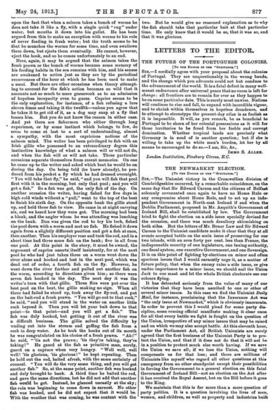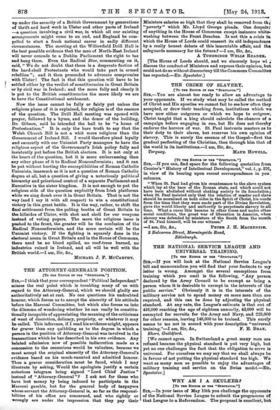THE NEWMARKET ELECTION.
LTO TILE EDITOR OF TIM " &ROTA/OB..1
Sra.,—The Unionist victory in the Cromwellian division of Cambridgeshire occurred, by a remarkable coincidence, on the same day that Sir Edward Carson and the citizens of Belfast solemnly covenanted once again to have no Home Rule or any compromise about Home Rule, and to set up an inde- pendent Government in North-east Ireland if and when the Dublin Parliament, proposed in Mr. Asquith's Government of Ireland Bill, shall be established by law. The Government tried to fight the election on a side issue specially devised for the occasion, and there was much desultory skirmishing on both sides. But the letters of Mr. Bonar Law and Sir Edward Carson to the Unionist candidate make it clear that they at all events accepted battle on the main issue of preserving for our two islands, with an area forty per cent. less than France, the indispensable security of one legislature, one taxing authority, one fiscal system, one executive Government, and one Sovereign. It is on this point of fighting by-elections on minor and often spurious issues that I would earnestly urge it, as a matter of future policy, that when the enemy raise a side issue, or give undue importance to a minor• issue, we should nail the Union Jack to our mast and let the whole British electorate see our colours flying.
It has detracted seriously from the value of many of our victories that they have been ascribed to one or other of several minor issues. In this case we find the Unionist Daily Mail, for instance, proclaiming that the Insurance Act was "the only issue at Newmarket," which is obviously inaccurate. In order to prevent this I would plead for some party dis- cipline, some rousing official manifesto making it clear once for all that every battle we fight is fought on the question of the Union, irrespective of any minor issues that may be raised and on which we may also accept battle. At this eleventh hour, under the Parliament Act, all British Unionists are surely agreed that the first business of the Unionist Party is to pro- tect the Union, and that if it does not do that it will not be in a position to protect much else worth having. If we save the Union we save all; if we lose the Union, nothing will compensate us for that loss ; and there are millions of Unionists like myself who regard all other questions at this emergency from no other standpoint except their possibilities in forcing the Government to a general election on this fatal Government of Ireland Bill—not an election on the Act after it has received the Royal Assent, but on the Bill before it goes to the King.
We maintain that this is far more than a mere question of party politics. It is a question involving the lives of men, women, and children, as well as property and industries built up under the security of a British Government by generations of thrift and hard work in Ulster and other parts of Ireland —a question involving a civil war, in which all our existing arrangements might come to an end, and England be com- pelled to start a fresh national career in sadly different circumstances. The meeting at the Willowfield Drill Hall is the best possible evidence that the men of North-East Ireland will never concede to a Dublin Parliament the right to tax and hang them. Even the Radical Star, commenting on it, said, " We do not doubt that there is a desperate faction of the hard-shell Protestants who would take part in armed rebellion"; and it then proceeded to advocate compromise with Ulster! The fact is that this question will have to be settled either by the verdict of constituencies in Great Britain or by civil war in Ireland ; and the more fully and clearly it is put to the British constituencies the more likely we are to have the Constitutional settlement.
Now the issue cannot be fully or fairly put unless the religious phase of it is explained, for religion is of the essence of the question. The Drill Hall meeting was opened with prayer, followed by a hymn, and the donor of the building, Dr. Gibson, said he intended the hall to be "a home of Protestantism." It is only the bare truth to say that the Welsh Church Bill is not a whit more religious than the Government of Ireland Bill. I would therefore plead loyally and earnestly with our Unionist Party managers to have the religious aspect of the Government's Irish policy fully and insistently put before the British electors. It is not only at the heart of the question, but it is more embarrassing than any other phase of it to Radical Nonconformists ; and it can be put without hurting the susceptibilities of Roman Catholic Unionists, inasmuch as it is not a question of Roman Catholic dogma at all, but a question of giving a notoriously politic al hierarchy and priesthood control of a separate Parliament and Executive in the sister kingdom. It is not enough to put the religious side of the question explicitly from Irish platforms while we sing dumb over it in Great Britain. That is not the way (and I say it with all respect) to win a. constitutional victory in this great battle. It is the way, rather, to shift the final settlement from the polling booths of Great Britain to the hillsides of Ulster, with shot and shell for our weapons instead of voting papers. The more the religious issue is pushed to the front, the greater will be the confusion of the Radical Nonconformists, and the more certain will be the Unionist victory. If the fighting is squarely done in the electoral arena in Great Britain and in the House of Commons, there need be no blood spilled, no roof-trees burned, no industries ruined in Ireland, and all will be well with the British world.—I am, Sir, &c.,
MICHAEL J. F. MCCARTHY.











































 Previous page
Previous page